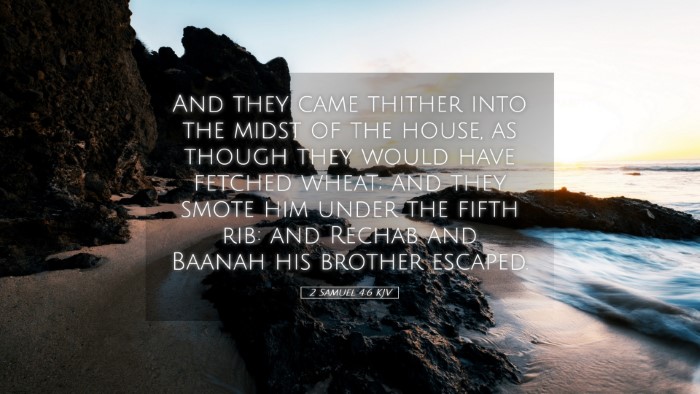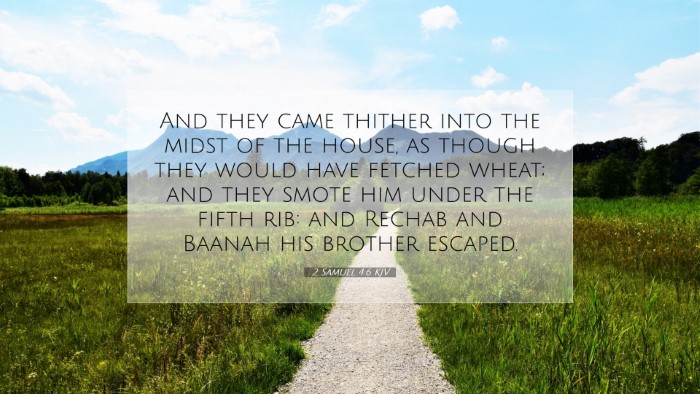Old Testament
Genesis Exodus Leviticus Numbers Deuteronomy Joshua Judges Ruth 1 Samuel 2 Samuel 1 Kings 2 Kings 1 Chronicles 2 Chronicles Ezra Nehemiah Esther Job Psalms Proverbs Ecclesiastes Song of Solomon Isaiah Jeremiah Lamentations Ezekiel Daniel Hosea Joel Amos Obadiah Jonah Micah Nahum Habakkuk Zephaniah Haggai Zechariah Malachi2 Samuel 4:6
2 Samuel 4:6 KJV
And they came thither into the midst of the house, as though they would have fetched wheat; and they smote him under the fifth rib: and Rechab and Baanah his brother escaped.
2 Samuel 4:6 Bible Commentary
Commentary on 2 Samuel 4:6
Verse Context: 2 Samuel 4:6 states, “And they came thither, unto the mid of the hill, and behold, they had the corn that was in the house. And when they came to the house, they had their fill of them.” This verse is situated in a narrative concerning the political turmoil following Saul's death and the actions taken by his remaining supporters.
Insights from Matthew Henry
Matthew Henry emphasizes the brutal reality of the power struggles during this period. He notes that the events leading up to this verse depict a horrific scene of betrayal and death, highlighting the destructiveness of ambition untempered by divine guidance. The context is significant as it illustrates how desperate individuals can act when seeking to secure power in a volatile environment.
Political Implications
According to Henry, this verse represents the lengths to which Abner’s men went to assert their dominance and settle disputes over leadership. The scene serves as a reminder of the inherent risks in political maneuvering, particularly in the respect and reverence that once marked Israel's leadership under Saul.
Insights from Albert Barnes
In his commentary, Albert Barnes points out the strategic implications of the actions taken here. He elaborates on the boldness of the men from Benjamin, reflecting on their fearlessness in coming to claim what they perceive as rightfully theirs. Barnes suggests that such actions illustrate the chaos that ensues when a nation lacks strong, unified leadership.
Theological Reflections
Barnes offers theological insights by contrasting the unfolding events with God's providence. He notes that despite the apparent chaos, God was orchestrating events toward the fulfillment of His promises to David. This observation reminds readers that beyond human strife, God's sovereignty remains steadfast. It emphasizes a key theme throughout the Scriptures: the assurance of God's control and the ultimate ascendancy of His appointed leaders.
Insights from Adam Clarke
Adam Clarke provides a detailed linguistic and cultural analysis of the terms used in this verse. He notes that the phrase “the corn that was in the house” symbolizes not only sustenance but also the abundance associated with God's blessings. Clarke encourages readers to consider the spiritual famine that often accompanies spiritual disenfranchisement, especially in leadership disputes.
Cultural Context
Clarke's examination includes various historical sources that affirm the importance of loyalty and support among tribal leaders. The alliances formed during this turbulent time often dictated the fate of communities, reflecting the deep-rooted customs of honor and fealty that governed ancient Israelite society.
The Interplay of Faith and Leadership
This verse and its commentary invite pastors, students, and theologians to reflect on the interplay of faith and leadership. Each commentator underscores the complexities and challenges inherent in spiritual and political leadership, offering valuable lessons for contemporary ecclesiastical structures.
- Lessons on Human Ambition: The narrative in 2 Samuel 4:6 serves as a stark reminder of how human ambition can lead to destructive outcomes.
- God's Sovereignty: The unfolding events remind the reader that even amidst turmoil, God’s hand guides the future of His people.
- Cultural Reflections: Understanding the cultural significance of loyalty and power during this period can aid in contemporary applications of leadership dynamics.
- Spiritual Lessons: The detailed analysis encourages a reflection on what it means to lead faithfully in accordance with divine principles.
Conclusion
The examination of 2 Samuel 4:6 through these public domain commentaries yields rich insights that resonate with our current understanding of leadership, ambition, and divine oversight. As readers engage with these reflections, they are called to consider how the principles derived from this ancient text apply to modern contexts of leadership and faithfulness.


